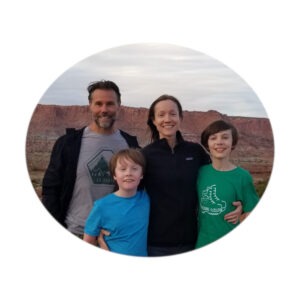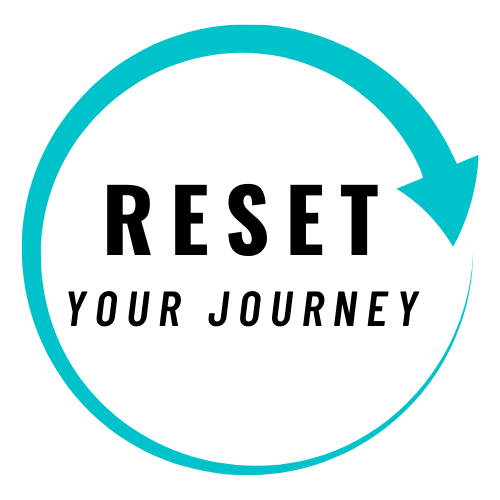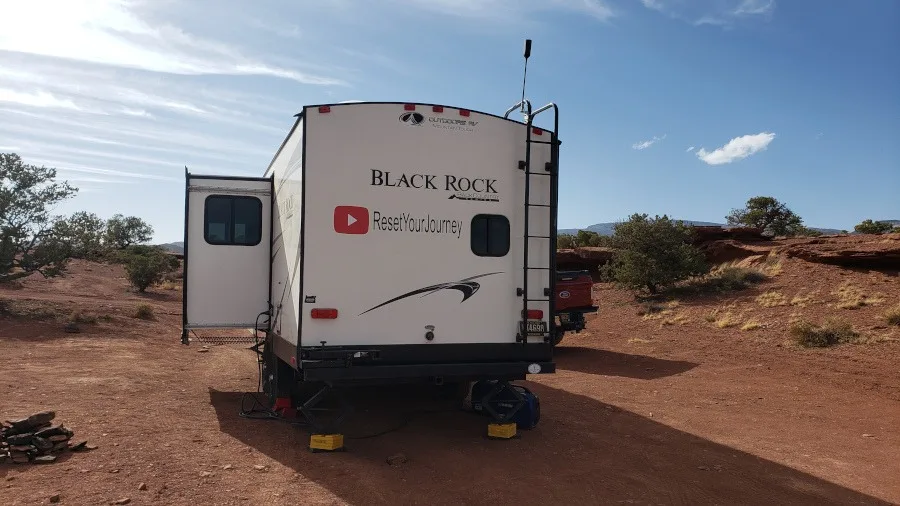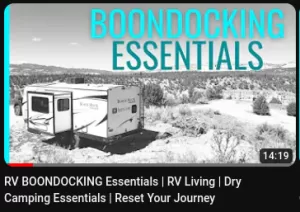Last Updated on 05/30/2024 by Glynn Willard
Boondock On Public Lands Or Pay For An Established Campground?
Your personal needs, camping style, and RV setup will dictate whether you stay in a developed campground or embrace dry camping.
So what’s better, boondocking in National Forests or paying for an established campground with full hookups?
In our experience, if you’re in the West region of the US, free camping on public lands is the best way.
This question is applicable to both full-time RV living and for those on RV vacations.
We lived on our first RV and boondock almost exclusively for two years, but we still have to used state parks and private RV parks on occasion.
Let’s take a realistic look at both options whether you camp alone or with your whole family and help you decide if you should use campgrounds, boondock exclusively or use a hybrid model.
Pros And Cons Of Staying In Campgrounds Fulltime
Campgrounds have their place. Let’s look at the pro’s and con’s for established campgrounds.
What Are The Pro’s Of Staying In Campgrounds?
-
Access To Electricity, Water & Dump Station
-
You Have A Guaranteed Place To Stay
-
It’s Easy To Meet New Friends
-
Most Of The Spots Are Fairly Level In Campgrounds
-
Trash Dumpsters Are Walking Distance From Your RV
-
An RV Resort Has Great Amenities
-
Laundry Facilities
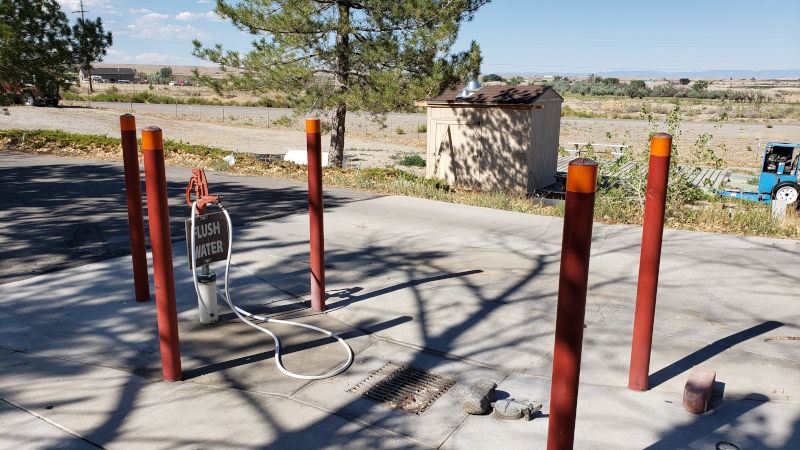
A dump site with a clean out hose is a welcoming experience.
Having access to electricity, water, a sewer hookup and picnic tables weighs heavily on most individuals decision.
Some people prefer not to worry about searching for water sources, rationing water (read “longer showers”), electricity or their waste storage tanks.
And this is understandable. Using a campground with full hook ups is a lot like living in a small normal house.
Those individuals who desire such a set up will likely not be interested in boondocking in remote places.
But if you’re on the fence about whether to boondock or stay in an RV campground, continue reading.
Another benefit that fits in this section is the fact that you don’t have to search for dump stations and safe potable water.
When we switch boondocking sites, we have a plan A, plan B and plan C within a specific area along our travel route.
There’s never a guarantee of a site being available or even accessible with our rig.
This is especially true if you have a larger RV that’s difficult to maneuver over rough dirt roads.
Yes, we’ve been in a situation once when plans A through C failed.
Honestly, those are pretty good odds over a two year period.
Fortunately, someone was kind enough to share their spot after we disclosed that we had been on the road for over ten hours.
But when you have a reservation, it’s as easy as just showing up, checking in and setting up at your site.
This is a good idea reduce anxiety levels if your an individual who is anxious about finding safe overnight parking for your family to camp.
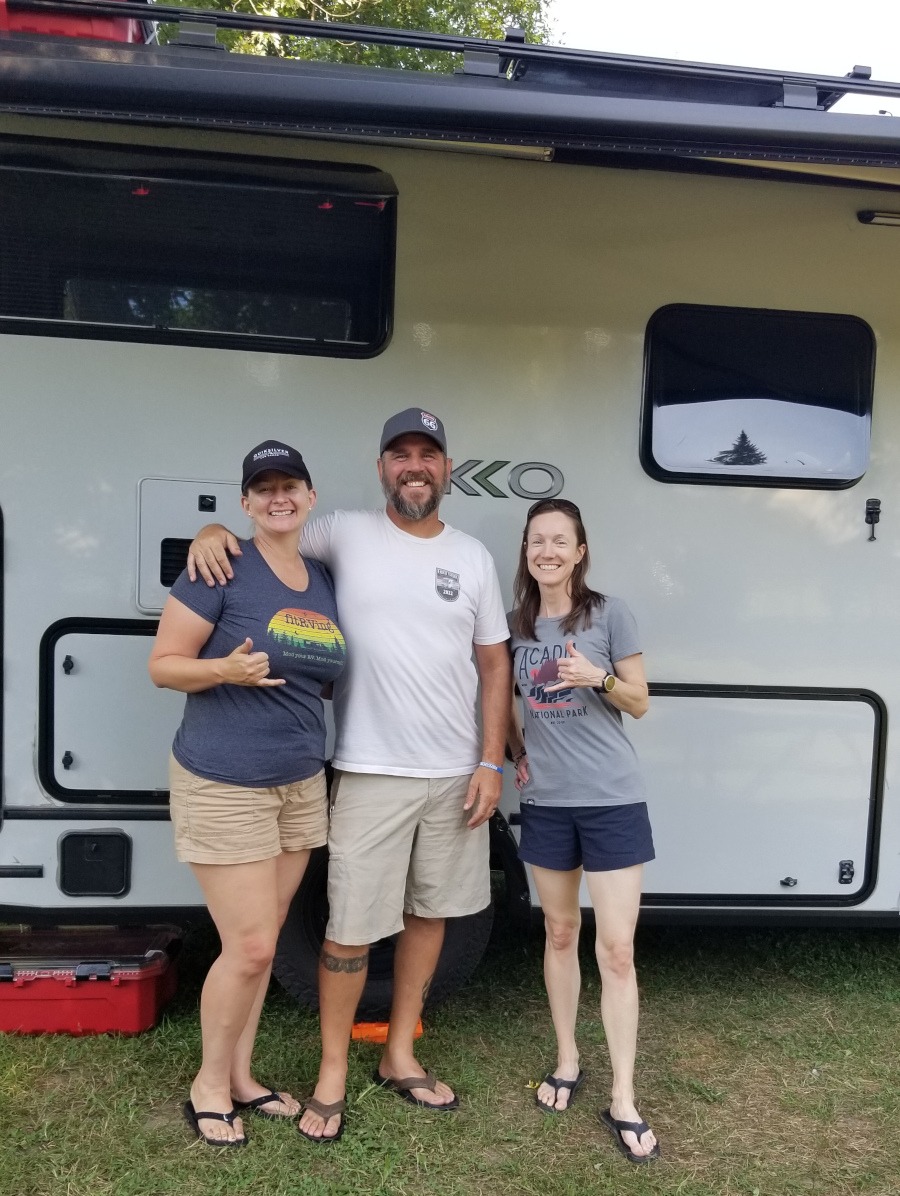
It’s so easy to strike up a conversation in campgrounds.
You’re surrounded by like minded people who are always happy to talk about camping, RV’s, tow vehicles and cool locations.
If you have kids, you’re almost guaranteed to find other kids around for them to play with.
Maybe this is good for you, maybe it’s not so good. Purely subjective.
Private campgrounds require little to no effort to level your rig.
State parks usually require some effort, but not too much.
If you have an automated leveling system, this may not be an issue for you.
We’re used to more work leveling on United States Forest Service land and BLM land, so easy leveling is a treat for us.
Trash management while living on the road is always something that requires planning.
Where to safely store it and where to dispose of it legally is constantly on the forefront of our planning.
We usually use Walmart’s and fuel stations that we patron. Otherwise, rest areas are our alternatives.
At a campground, it’s just a short walk away from the camping area.
It’s a luxury taken for granted by most recreational campers.
We’ve stayed in two RV resorts within the last four years that were worth the high price.
There were enough activities, sporting facilities, pools, hot tubs and entertainment to remain within the resort for quite awhile.
If this is your jam and you have the financial resources, wild camping is likely low on your list of priorities.
Look into the Palms RV Resort in Yuma, AZ and Normandy Farms Campground in Foxborough, MA if this sounds appealing.
Full-time RVers understand the value of inexpensive, clean laundromats!
When there’s one near the camping spots, it’s a real luxury and relief!
If you know, you know. Enough said.
What Are The Cons Of Staying In Campgrounds?
-
You’re WAY Too Close To Your Neighbor
-
It Can Get Really Loud In Campgrounds
-
It’s Almost Always “Party Time” in Campgrounds
-
Overwhelming Amounts Of Campfire Smoke
-
It Can Be Difficult To Book Popular Areas
-
Overnight Stays In RV Parks Are Expensive!
-
We Don’t Always Feel Safe In Campgrounds
This is easy to figure out and there are certainly plenty of campgrounds that are a little more spacious.
But we’ve been exposed to a few that with your slides out, you can reach out the window and touch your neighbor’s RV.
That’s way too close for comfort.
So you can really give up any concept of privacy, a quiet night sleep, or respect of your property.
Not all campers are good neighbors.
We’ll never forget the time we had to divert last minute and stay at an RV park along the highway.
It was primarily occupied by fulltime renters, not campers.
It was just for one night. How bad could it be?
I should have known when I noticed the home built motorcycle with very short tail pipes by our neighbors trailer.
We went to bed around 9PM and at 12:30AM, he fired up the bike, warmed it and revved hard before tearing out of the park.
We all about had a heart attack! Once we finally fell asleep, around 3AM, he returned and was not quiet about his return.
We gave up on sleep. So much for a “safe driving” day!
There have been many other circumstances where people close to the trailer are partying and being loud.
It’s difficult to drown them out when they’re close. A noise machine and the air conditioner is not always enough.
A Walmart parking lot may have been a better option!
This is something that is a personal issue for me.
If you enjoy being submerged in the drinking and party world, than it may be a pro for you.
But we lived in our rig (now we’re part-time), exercise daily and eat very healthy 95% of the time.
Saturdays are our break day to eat whatever we like. Not everyday of the week.
When so many people are drinking, it’s more challenging to abstain.
This is just something for you to consider if you prefer not to drink or do so in real moderation.
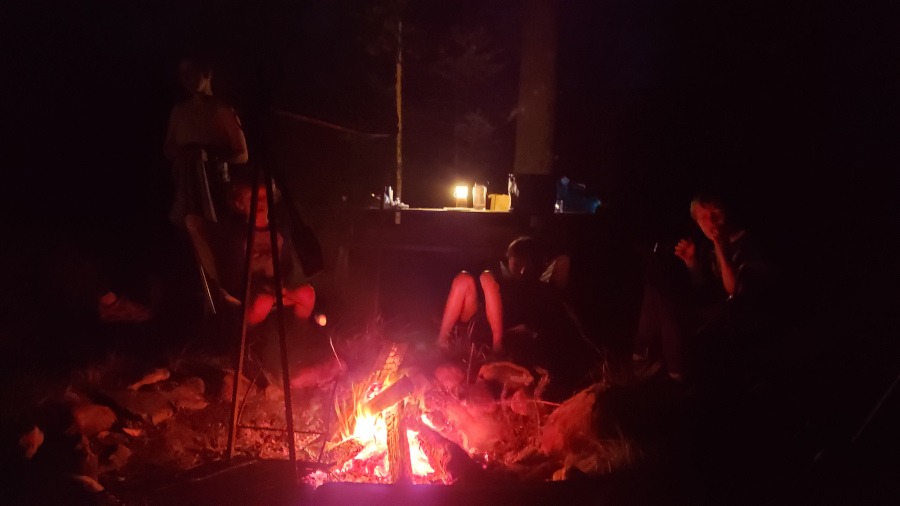
This corresponds with the party atmosphere and is more prevalent in state park campgrounds than private campgrounds.
If you’re sensitive to smoke, keep this in mind when booking state park campgrounds.
It can be a real downer when it’s beautiful out in the evening and you can’t even sit out and enjoy the weather because there’s too much campfire smoke.
We have to shut our windows and run the air conditioning regardless of the temperature, just so we can breath comfortably when in this situation.
Again, this may not be an issue for you.
I see this as a common complaint of individuals trying to go fulltime.
They want to stay in the best camping locations near all the great national parks and popular attractions.
First, most of those campgrounds are very expensive and secondly, you sometimes have to book a year in advance.
If this is your vision for your family, plan your adventures accordingly to avoid disappointment.
When we go many months at a time out west and I look at our expense reports, our line item for campgrounds is usually $0.
Our line item for camping fees (water and dump stations) is around $80. That’s based on the few places that charge.
But when we have to stay in the east with no Bureau of Land Management land available, our line item for campgrounds is between $1,000 and $2,000.
And that’s usually in a 5-8 week period.
And we spend very little time camping in the east for obvious reasons!
Yes, booking a month at a time in an RV park will reduce that expense.
Regardless, you can see how fast the expenses add up!
I can think of much better uses for your money.
The bottom line, we feel safer boondocking in a remote location.
You can read more about this in our article Is Boondocking Safe? Our Scariest Experiences Boondocking.
Pros And Cons Of Boondocking
Let’s take a look at some of the pro’s and con’s of boondocking fulltime, part-time or on vacation in an RV, fifth wheel or travel trailer.
Yes, you can “boondock” in the following locations:
- Truck stops
- Cracker Barrel
- Big box stores
- A rest stop
- Harvest Hosts
- Casino parking lots
But I’m referring to boondocking in remote areas on public land.
Pro’s Of Boondocking In Your RV
-
You Have A Ton Of Space To Yourself
-
There’s Plenty Of Privacy
-
There Are No Check-In or Check-Out Times
-
It’s Free!
-
There’s Usually A Trailhead Near Boondocking Locations
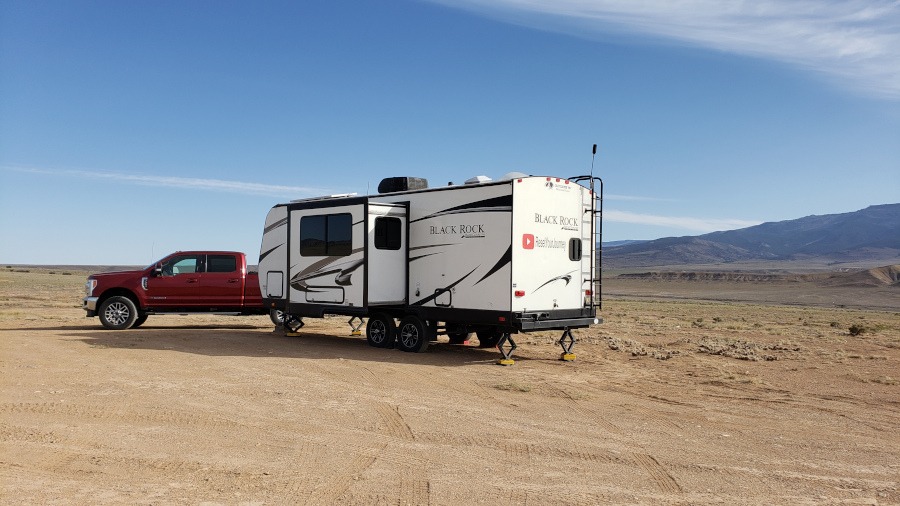
This is what I like best about boondocking in the great outdoors.
For the most part, you’ll be really far away from your neighbor if you have a neighbor at all.
This translates to plenty of space to move about in some of the best wilderness areas!
It also means it’s quiet and really dark at night in the middle of nowhere (great star gazing).
If there is a noisy camper in the vicinity, they’ll likely still be far enough away to not cause you a bother.
Also, if you found a spot with a great view, it won’t be blocked.
You have so much space to yourself, you can sometimes shower outdoors.
That’s a plus when you’re trying to conserve space in the gray tank and use less from your freshwater tank.
It’s a great way for the kids can play in nature and you can almost always see them from any part of the rig.
Speaking of nature, you’re really immersed in the best of what nature has to offer.
This is something I love!
You can arrive and leave whenever it’s convenient for you.
And if there’s bad weather on moving day, you can wait it out and move on a different day.
Also, if you’re unhappy with a spot, there’s no financial obligation to stay.
You can switch to a different spot within view or move away all together.
With this type of camping, our departure time is solely dependent on the distance we’re driving on that particular moving day.
Free campsites! Need I say more?
For the most part, it won’t cost you a dime.
Although, on occasion a designated spot on BLM land will cost you a nominal fee.
That’s not to say you might spend a few bucks on gas for the generator or an upfront cost on solar power.
We usually use five gallons of gas for seven days while boondocking.
This allows us to run our microwave and air conditioners as well as charge our devices.
Even between $3-5/gallon, that’s inexpensive camping.
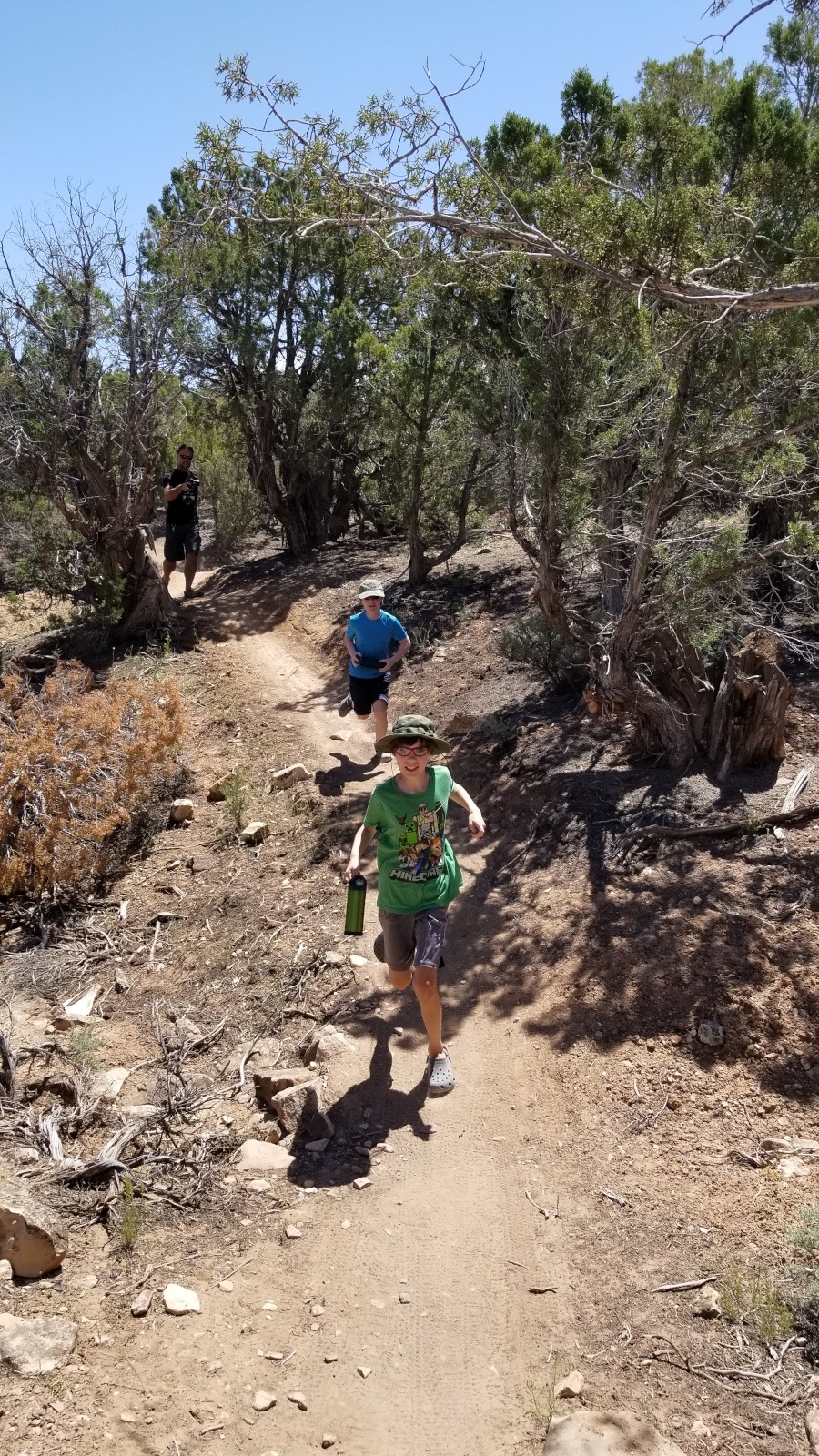
Trailhead eight by boondocking location in western CO.
We almost always find a trailhead near our boondocking spots.
I do early morning hikes and we usually hike as a family at random times of the day.
We find it very appealing not having to drive to a trail to get in a quick hike.
Especially since the boys can’t yet hike as far as Rose and I.
Cons Of Boondocking
-
You’re At The Mercy Of Your Freshwater And Waste Tank Sizes
-
Most Spots Are Unlevel
-
Road Conditions To Boondocking Locations Can Be Poor
-
Using High Wattage Appliances For Longer Durations Requires A Generator
-
Sometime There’s Little To No Cell Service
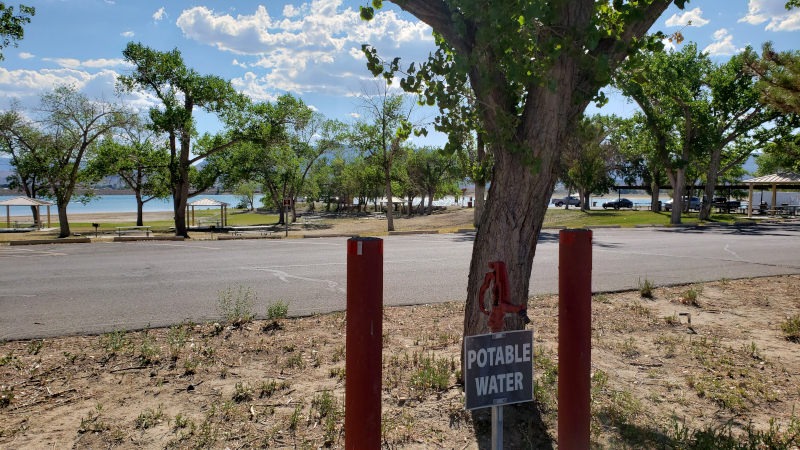
This is a state park, so I trust the sign despite the red handle.
Some RV’s are well equipped to boondock long periods of time because they have large fresh and waste water tanks.
But most RVs are not.
You have no choice but to pay close attention to your water use and the capacity used of your black and gray tanks.
Once you have this information well covered, it becomes less challenging.
But alas, you’re still at the mercy of your fresh water tank.
Once the water runs out, the party’s over.
Yes, you can transport water to your camping sites in portable tanks and bladders. And sometimes it’s worth such effort.
Learn more about water and boondocking from our article How Much Water Do You Need While Boondocking?
Or from our YouTube Channel.
You’ll have lots of opportunities to hone your leveling skills.
This is a great video showing you some tips to leveling on very unlevel surfaces.
It’s super rare when we find a perfectly level spot when boondocking.
Because of the frequency we boondock and move, we’ve gotten really good at leveling quickly.
Even if you have an automated system, you may still have to dig down or use leveling blocks.
This is a small inconvenience and is outweighed by all the benefits of boondocking if you ask me.
Some of the best dispersed camping locations are down some gnarly dirt roads.
Many of which are impassable by most RVs.
If you have an overlanding RV with high ground clearance and four-wheel drive, you’ll have no problem.
If you love air conditioned air, get used to running a generator.
Without electrical hookups, you’re battery bank will not run an air conditioner for long (or at all).
Even the most robust solar/battery systems can’t keep up with all day air conditioning day after day.
We’ve learned to curb our utility needs and minimize the use of the generators to find the “sweet spot” of comfort while boondocking.
Our solar panels and batteries in our last RV kept our DC based systems (lights, water pump, slide and fan) running indefinitely without issue.
We didn’t have an inverter, so we needed an inverter generator.
Not a big deal as we feel like we still live a totally normal life.
Our current campervan has 600 amp hours of lithium, but will only run the air conditioner for 3-4 hours.
When you’re deep in state forests or BLM land, there can be little to no cell service.
If you have to work remotely, this can be a deal breaker.
But the good news is that we almost always found great boondocking with a data signal.
Starlink is great if you have a view of the horizon, but almost useless under tree cover.
Not Sure What You Need For Your RV?
Benefits Of Using Both Campgrounds And Boondocking
The best option is to sometimes use a campground (once or twice a month).
This way, you save money and enjoy the space boondocking allots, but are still able to enjoy electric hookups and a longer shower several times a month.
It’s also nice to spend time out on the land and know you have a designated place to dump your tanks and grab fresh water.
We know of several boondockers who book campgrounds once a week.
That way they never have to search for dump stations and potable water.
Many campgrounds have laundry facilities, which if used once a week checks another important box.
The reality of this lifestyle is that it’s really only possible in the Western United States (for US bound RVers).
Those in the east will have to spend a predominant amount of time in campgrounds.
Pro tip: book a campground in the region you plan on boondocking and use your time there to scout out locations.
That way, you’re dumped, filled with water, recharged, laundry’s done and you already know where you’re trying to boondock first.
Have you thought about boondocking instead of using campgrounds?
Happy and safe travels!
Meet the author.
We appreciate any help we can get to bring you great content. Donate or buy us a coffee on our Ko-Fi site.
